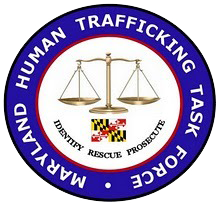About the Task Force
The Maryland Human Trafficking Task Force (MHTTF) was formed in 2007 by the U.S. Attorney's Office, the Attorney General of Maryland, and the State's Attorney for Baltimore City to serve as the lead investigative, prosecutorial, and victim services coordinating body for anti-human trafficking activity in the State of Maryland.
We are a multidisciplinary team of agencies and organizations committed to a victim-centered approach in the fight against human trafficking in Maryland. Our record of success in rescuing and serving a range of labor and sex trafficking victims is irrespective of gender, nationality, sexual orientation, or age.
Maryland joins a small number of states at the forefront of victim response due to the forward-looking efforts of investigators, prosecutors, concerned citizens, advocates, and legislators who believe that the work of the Task Force is necessary to protect human dignity and public safety.
The Task Force builds upon existing collaborations among victim service providers to increase the identification of victims and provide a more comprehensive, specialized, and coordinated response to victims’ complex long-term needs.
Multiple state agencies join the MHTTF as a force-multiplier in the fight to raise awareness at the local level to expose traffickers, and developing polices to respond to victims in a united front across state systems.
MHTTF trains law enforcement and prosecutors to ensure that traffickers are held accountable for their heinous offenses.
Through increasing public awareness, coordinating state policies/protocols, and implementing best practices for investigations, prosecution, victim identification, and victim service response, our message is clear: In Maryland, victims will be recovered and traffickers will be held accountable for their crimes.
Seven subcommittees combine to form the Maryland Human Trafficking Task Force:
|
